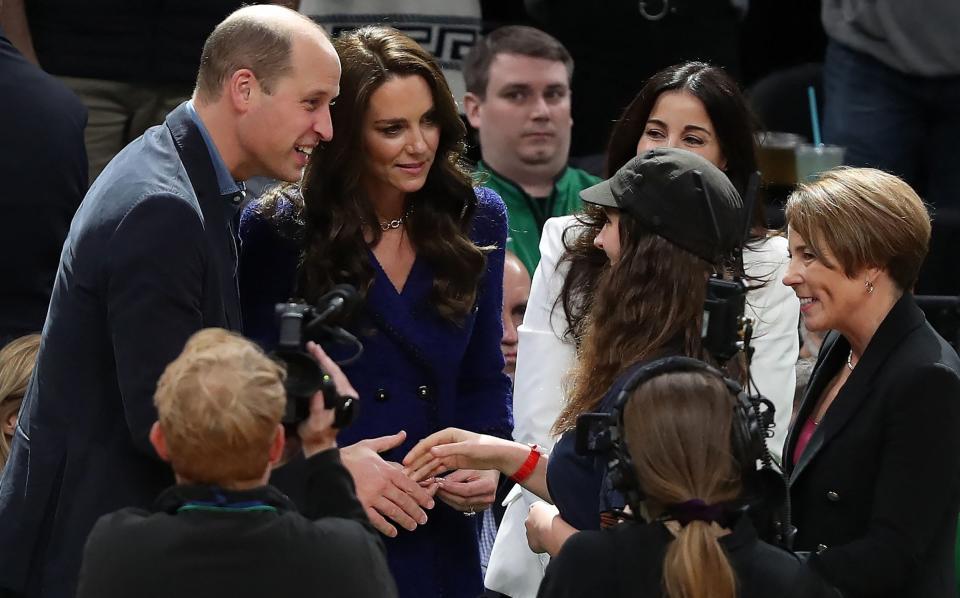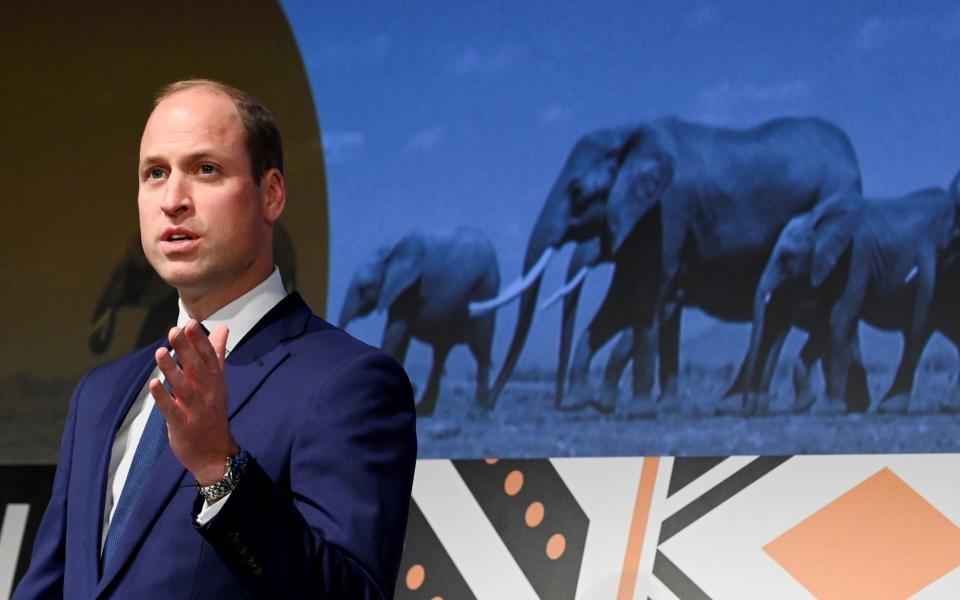‘The Prince of Wales understands Africa – he’s the most suitable young leader for our world’

When the Prince of Wales steps on stage to award the 2022 Earthshot prize in Boston, Patrick Mavros will be watching from Zimbabwe with particular pride. Having worked with the Prince for about a decade, Mavros understands how important it is to have a powerful figurehead fighting for change in African conservation.
“The Prince’s commitment and his application has given him real respect, from scientists to the most simple hardworking conservationists,” says Mavros, a renowned silver sculptor and jewellery designer.
“He has this innate passion for the conservation habitat and all the creatures that inhabit it. The work the Prince of Wales is doing, to publicise the issues animals in Africa are facing, is really fantastic. It’s great to see someone with that platform using it for good.”
Mavros adds with enthusiasm: “The Prince has earned the respect of seasoned conservationists in Africa – and that’s not an easy thing to do. All hold him in admiration – he’s a torchbearer. He gets it. He understands the actual challenges Africa faces – he’s the most suitable young leader for our world. He’s absorbed our problems and understands them, but he also communicates them well.”
Africa means everything to Mavros. Born in Zimbabwe in 1954, he is descended, on his mother’s side, from Scottish landed gentry; his paternal grandfather was a Greek goatherd who left Europe for a better life. His own childhood was spent with his parents and three sisters in homesteads and villages around Zimbabwe as his doctor father moved about the country, offering his services to local communities.
“I spent most of my time with our Malawian cook,” says Mavros, “looking for eagles, klipspringers [small antelopes] and snakes, and pieces of wood that he would make traditional masks from. My father would take me to meet local chiefs and I would watch how they conducted themselves. I was lucky to be exposed to so many facets of my country.”

It was not an easy life. At the age of six, Mavros caught polio and was confined to first his bed and then his chair for two years.
“I remember each day I had polio so clearly, but I’m grateful for it because it made me work harder,” he says. “I learned about stamina and courage and once I could move, little matchstick legs – as everyone called me – was the first up a 150-foot tree.”
Forced conscription at the age of 18 created disillusionment with the old colonial power. “My grandfathers fought in the Zimbabwean war of 1890 and here I was again fighting those same clans in 1970. We were all young men who had grown up on the same soil.
“It felt horribly circular so when my little boys went to school in the 1990s, with the sons of the men I had been fighting, and they played cricket together, I felt a kind of joy. This was the reconciliation preached by Mugabe.”
Mavros is an unusual Zimbabwean in that he seems to bear little ill will towards a regime that forced thousands of white families off their land and into exile. Land reclamation began officially in 1980 under Robert Mugabe, and over the next 30 years every white-owned farm in the country was either expropriated, or confirmed for future redistribution. Mavros saves his anger for the colonial regime.
“The land apportionment act of 1930 was a terrible piece of legislation that turfed families off land they had been on for 1,000 years. When [white] farmers talk about losing their properties we must remember this total upheaval. Zimbabwean culture is based on oral history and community responsibilities and we smashed that in 1930. People were rightly fighting for their land back. What I disagree with was how an intelligent man like Mugabe made such a mess of redistributing it. It was the right move, done badly. But the British did not own Zimbabwe.”

Mavros stayed despite the turbulence, marrying his wife Catja and raising their four sons, Alexander, Forbes, Patrick Jnr and Benjamin. All are artists and three have stayed on in Zimbabwe to help run the business, which began after Mavros left the army in 1978. He made Catja a pair of silver earrings; she wore them to the hairdresser and two women she met there requested a pair.
Later, he made his wife a sculpture in the shape of a klipspringer. These small, shy antelope are some of the most loyal animals in the bush; they mate for life and rarely step five metres away from each other. Couples began requesting his silver designs as anniversary gifts and before long Mavros had become the jeweller of choice in the northern suburbs of Harare.
Mavros is a natural-born story teller. I had been in been in his Chelsea store for less than ten minutes before he started telling me a story, complete with the honks, grunts and roars of the animals he has made a career from recreating. It was a sad tale - one where the crocodile flips a canoe and drowns a teenage girl on holiday with her parents - and he tells it to illustrate the raw reality of Africa away from the picture-postcard images we are sold in Britain.
As the gentle English rain patters down outside, Mavros is drawing me into his world - a world where he casually catches the pythons that slither into his house on the outskirts of Harare; where he teaches his tiny granddaughters how to trap scorpions with the flick of a wrist and kits his pet dachshund out in anti-snake helmets.
Our enduring fascination with this version of African life is a huge part of why Mavros has been so successful. For over 40 years he has turned elephants, giraffes, hyenas, lions and nearly every other African animal you can think of into silver ornaments, sculptures and jewellery. They’re lovely, but the sheer force of Mavros’ personality is as integral to the success of his brand - which has stores in London and around Africa but customers all over the world - as his designs
His clients today are CEOs, city lawyers, hedge fund managers and the English upper-middle classes. He makes them mustard pots in the shape of elephants, baobab-tree beer mugs and gorilla family candelabras.
Mavros’s fans include the Royal family. The Princess of Wales has worn, among others, his “Ocean Tides” earrings, created in 18ct gold with a milky quartz stone and a small diamond, numerous times. He won’t talk about which other pieces they have bought, but he is happy to reminisce about the late Queen Elizabeth II.
“She was wonderful,” he says. “She was escorted by my grandfather Sir Patrick Fletcher when she visited our country in the 1950s. She loved stories about Africa.”

Each of his pieces is drawn from memories of animals he had watched and befriended over the years.
“One of my first designs was a small silver elephant. It was a bull I got to know and the last time I saw him was when he was reaching up to eat marula berries, which taste like Swiss chocolates to elephants. The next time I heard him was his screams, as he was killed by poachers. I still hear them sometimes.”
Unsurprisingly, Mavros and his family are dedicated to conservation. In common with so many Africans with lifelong experience on the continent, he believes the only chance we have of keeping endangered species alive is by looking frankly at the way humans and animals interact, and how they can share the land.
“The wildlife charities get it wrong,” says Mavros. “Don’t come here with regulations and stipulations and penalties – look at the communities, talk to them, have some humility.”
Hence his support for Tusk, which counts Prince William as its patron and one of very few that Mavros believes has “got it spot on”. The British-based organisation prides itself on working towards a future “in which people and wildlife can thrive across the African continent”. Unlike many other charities, Tusk believes local organisations are best positioned to address threats such as poaching, but are often under-resourced and lack the recognition they deserve.
His thoughts turn back to the Prince and Princess of Wales. “They’re so popular in Africa. They’re an idyllic couple. They have so much to do in Africa – so many young people look up to them and are inspired by them. The older people in Africa respect the Prince, but it’s the younger people who are the most enthusiastic about him.”
Mavros was at the Tusk Awards last month, having been responsible for making the official silver trophies. “I’m so happy to participate. Every one of those recipients acknowledged that without the community they’re nothing. Tusk gives people dignity and pride. It’s the only way to make progress.”

 Yahoo Movies
Yahoo Movies 
